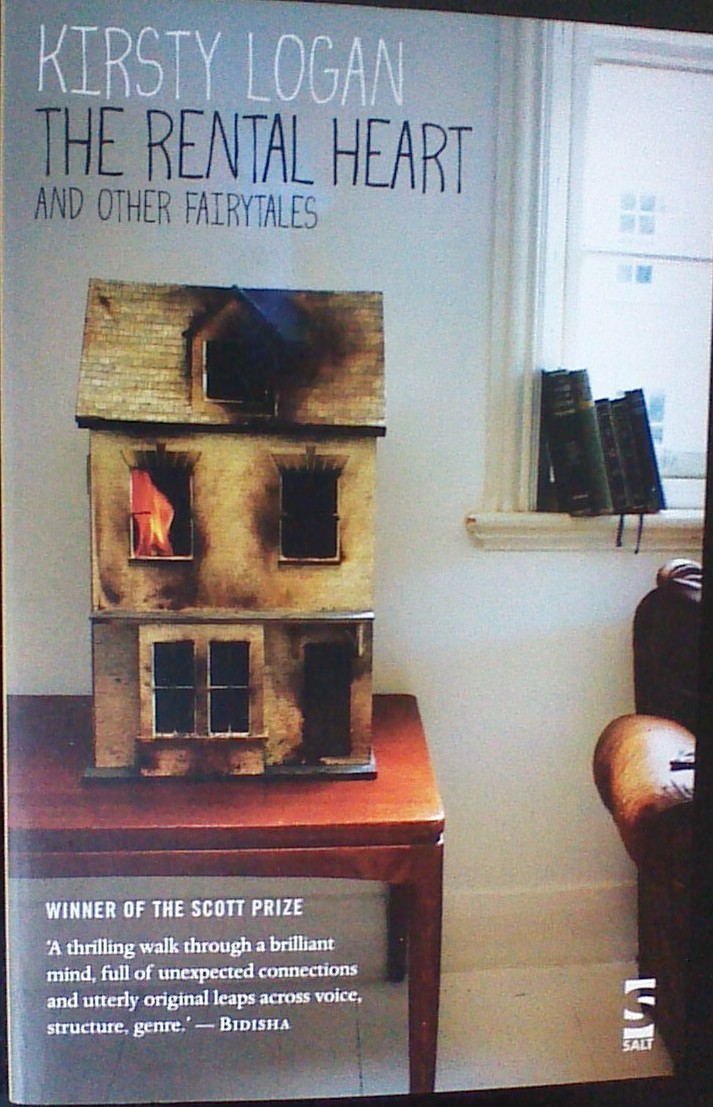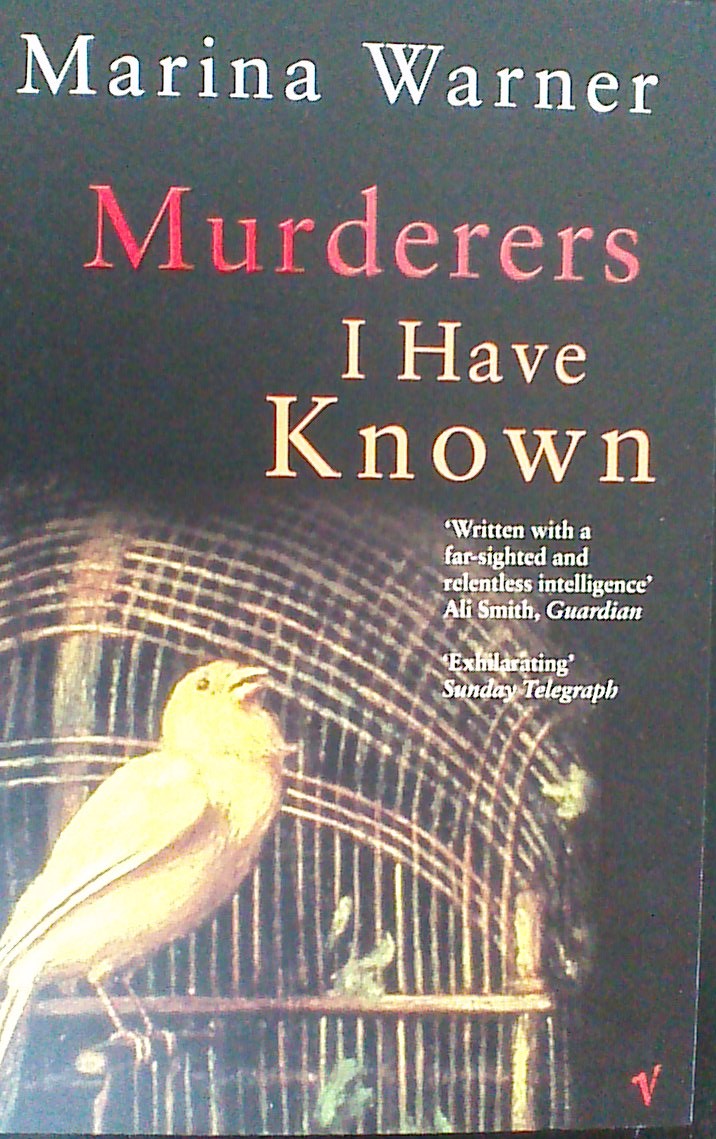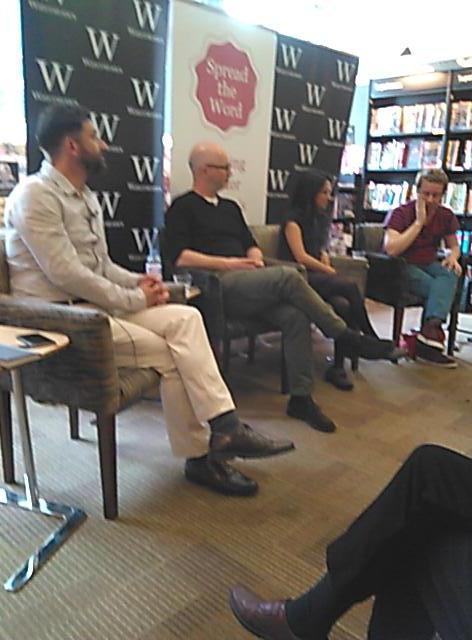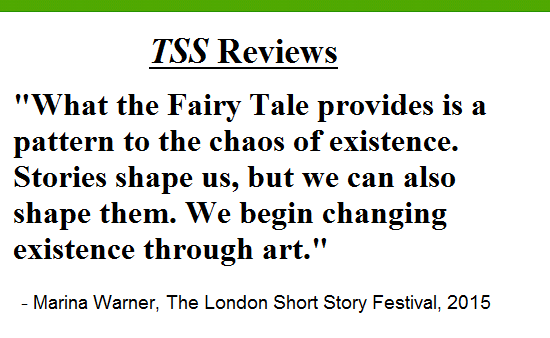Review by Rupert Dastur
It’s the last day of the London Short Story Festival.
I arrive to the first event which is packed out, to the extent that extra chairs have to be brought. We’re here to listen to Julia Bell chair ‘Fairy Tales and the Short Story’, starring Dame Marina Warner, Aamer Hussein, and Kirsty Logan.
We’re given a long introductory essay-styled reading by Dame Marina Warner which is studded with insight and intrigue. In the simplest sense, the fairy tale is, ‘a short story with some magical elements… a climate filled with unpredictability.’
‘Fairy Tale is the language if imagination,’ says Warner, stating the increased use of the genre in the last forty years, beginning with writers like Hioffmann, Kafka, and Borges.
‘The fairy tale does not belong to everyday experiences as the short story does… they use a different language; in the fairy tale the system of imagery is rich and complex. The Fairy Tale form also brings with it an assumption that the tale will end in hope.’
We’re told that the Fairy Tale is close, but different from myth: ‘there is less a sense of the divine, whereas in fairy tales there are the beings that are nameless and ominous, like the force that turns Kafka’s famous protagonist into an insect…
‘In the fairy tale there is a sense of the here and now, the uncanny…
‘The Fairy tale assumes that all matter is saturated with memory. As a language, Fairy Tale allows writers to play with expectations, far beyond modern game-playing… there is a classic lineage of twisted stories, which the Fairy Tale gives a certain familiarity to… there is a kind of irony that the characters don’t know what’s going on, but the reader does; it’s almost prophetic.
‘If the expectations of the Fairy Tale are met, then there is a sense of satisfaction in the ending. But if not, then the reader is still given a sense of pleasure in the challenge to convention, which itself working with a framework, maintaining a relationship with the past.’
Warner continues with her explication, telling us that in many ways the fairy tale is a hybrid, and contains and encompasses all kinds of genres, from fantasy and science fiction to gothic and horror. Currently, she says, there is a trend towards the fairy tale directed towards the older reader because fairy tales ‘reflect reality – all the sex, cruelty, and violence of everyday life’.
We’re informed of the fundamental part that criticism – particularly feminism and post-colonial – has played on the development of the fairy tale; Warner cites film at this point, directing our attention to examples such as The Piano and Maleficent.
Today, the fairy tale is seeing a return to the narrator’s voice – the protagonist’s perspective – ‘writers are returning to the character with the subjective voice you see in literature from long ago, as with The Golden Ass, for example.’
‘What the Fairy Tale provides,’ says Warner, ‘is a pattern to the chaos of existence. Stories shape us, but we can also shape them. We begin changing existence through art.’
Following this lengthy and endlessly engaging introduction, each writer gives a reading.
Logan’s piece plays of Bluebeard and is challenging and poetic, opening with lines such as ‘The roots of my hair feel gold-dipped.’
Hussein gives a reading that is an intriguing patchwork of fairy tale and realism, beginning with the curiously with ‘I once knew a woman who loved a swan.’
Lastly, Warner offers a reworking of an old tale set in modern times that maintains a feisty, unsettling tension with a distractingly powerful ending – like drinking a spirit which at first seems innocuous enough but then leaves an intense aftertaste.
The readings were followed by a few pertinent questions and discussion of the fairy tale. Logan reveals that she can’t help writing fairy tales, ‘Even when I’m trying to do something else, they just sneak in… They’re so important to our lives.’
Warner: ‘Fairy Tales give you an Aristotelian licence… in this sense the Fairy Tale can do something very interesting with, say, charter.’
Hussein nods and adds that fairy tales ‘illuminate one’s daily existence.’
Logan: ‘They allow me to discuss very difficult emotions. You can have all kinds of characters in fairy tales.’
Warner responds to this perceptively, ‘There have always been plenty of queer characters in Fairy Tale – fairy tales provides a space in which to discover these fringe characters.’
It’s also the case,’ continues Warner, ‘that often these extraordinary characters turn out to be just like us… so that really, the princess is in fact a poor girl.’ Warner recounts being told that ‘the fairy tale is a story in which one king goes to another king to borrow a cup of sugar.
‘Fairy tales are filled with poverty and abuse and other difficult subjects. There is a long tradition of emancipatory people who have worked with the fairy tale – Walter Benjamin for example.’
Bell asks whether this is morality is part of the makeup of the fairy tale.
‘Personally,’ says Hussein, ‘I look to avoid that – I like to leave things suspended.’
Warner agrees: ‘Yes indeed and it’s interesting to note how many fairy tales don’t have happy endings.’
Logan, is quick to offer a slight shift in tone, ‘Well I’m a romantic hippy,’ she says, ‘so I kind of want everyone to just love everyone.’ She goes on to say this is partially affected by the fact that a lot of lesbian literature she has read always ends depressingly ‘What is ups with that?’ she asks, raising her eyebrows quizzically, ‘I know loads of lesbians who are together and really very happy!’

Bell provides another question – have any writers ever spooked themselves while they’ve been writing? The question leads to a brief exploration of writing itself:
Warner: ‘Some people won’t let their imagination got that one step forward. There is a huge difference between one part of the mind and another – but you’ve got to get to a particular place to write – you can’t be answering email. It’s hard, but when I imagine it, when it happens, I’m accessing those important parts of the unconscious – it’s very, very strange, thoughts and ideas and visions appear to come from nowhere. Harold Pinter, to my astonishment, said that when he started to think of a play, he saw a patch of ground and that it began expanding, like a hallucination.’
‘For any writer,’ contributes Hussein, ‘that idea that you’ll be accessing the subconscious is very exciting. It can leads to anything and everything.’
‘Is there anything taboo in the fairy tale? Anything you wouldn’t write about?’ asks Bell, the last question of the event.
‘Personally, I wouldn’t write about incest,’ says Warner, and then proceeds to summarize an Icelandic tale which involves a love relationship she has only ever encountered once. It begins, we’re told, with a man going out to hunt, leaving behind his wife and his mother…
‘The trouble with prohibitions,’ says Warner a little later, ‘is that they’re often rather difficult to see. We’re so involved in them. But the forest is the place you can try all sorts of things out and learn and understand.’
The questions come to an end, but at the book-signing I’m able to catch a minute with Logan. I ask a simple question, but one I’d had for a while: is the Fairy Tale is necessarily short?
‘I think it needs to be rooted more in reality to be of that length and to work,’ replies Logan. ‘It’s harder to maintain a conceit for that long – you would have to have a grander idea than many of the aspects contained in the short story.’ She then signs my book with a heart and the message ‘Short Stories Forever!’ I couldn’t agree more.
After a brief break, Word Factory present Deborah Levy, SJ Naudé, and Dame Marina Warner. The event is chaired by Word Factory Director Cathy Galvin.
The discussion opens with a thought-provoking question that sounds like the beginning of a grand thesis.
‘Is all writing a political act?’ asks Galvin.
Warner pauses to reflect, and then begins. ‘Unconsciously, yes, but it’s important not to start with this… writing material should be more emotional. The philosophy of fiction is really about understanding people, which is political. Politicians should be made to read more fiction, then they would understand other people better.
‘It’s also interesting to note that political regimes suppress writing – there are huge numbers of writers not living in their native countries any more. Thinking back to the Man Booker Prize Shortlist – I helped judge last year – only three lived in their native homes,’ concludes Warner.

Levy: ‘I think that writing that has no politics in it is really dull – all writing has some kind of psychological, political, slant. Though I don’t like to feel like I’m being pounded against a wall when I’m reading something – though I suppose good can come from it. Yes, I think all my writing is political – it covers class, race, what we say about other… I can’t think of anything that doesn’t circle that stuff.’
Naudé: ‘Asking a South African writer about political writing… well, it’s going to have a particular resonance. In the 60s and 70s, political writing overcrowded everything else. Personally I think of writing as disruption – not a bourgeois entertainment. But I am cynical about its ability to have a major effect, though I remember hearing about one police department in America that demanded that their workers read novels in order to expand their imaginative scope…’
‘Can you force people to read?’ asks Galvin.
‘Good question,’ responds Naudé.
‘When you went on a creative writing course,’ says Galvin, her attention on Naudé, ‘you thought you would write a novel, but it ended up being a collection of short stories…’
‘Yeah and the kind of thing D. H. Lawrence would have written,’ says Naudé. ‘It became a strange hybrid, in between two beasts’ The thing about short stories, he tells us is that you can ‘write with a unity of mood and fervour – also there is less risk; if you fail you’ve spent less time on it.’
‘What can you do with the short story that you can’t do with other forms?’ asks Galvin, opening up the discussion.
‘I think the short story has a way to go in terms of development,’ says Levy, ‘ but for now, a short story… it’s a form you have to inject with a lot of life – and it needs a lot of life because it’s so short. Although this doesn’t mean it needs to be energetic or turbulent – it can be flatter.
‘Nevertheless, there’s something that comes from making a reality, a world, very quickly, that subverts quietness. I always like to think that with short stories you create a reality with your right hand and then mess it up with your left.’
Naudé ends the event on an amusingly heavy note: ‘The short story is melancholy by nature,’ he says, ‘it’s like a terminally ill patient.’
The last event if the day and the entire festival is centred around the Sunday Times EFG Short Story Award – an award that offers a cool £30,000 for the winner. The panel is chaired by Paul McVeigh and the speakers include Toby Litt, Tahmima Anam, and Kevin Barry.

For this last event, I decide I won’t notes. I just want to sit back and listen to masters of their craft read their work and talk about writing.
Litt gave a reading that was rhythmic and repetitive, focused on story-telling, myth, and origins. It was something that he’d been mulling over for t a number of years.
Anam’s story had a more political hue, illuminating the conditions of her character who were working in countries where conditions were beyond awful. She captured the struggle, grid, and graft of those we hear about so seldom.
Barry gave an animated performance in the first person – a jocular London cabbie driver with plenty of thoughts on his mind.
The discussion was entertaining and I couldn’t resist scribbling down a few jems…
Anam: ‘In some ways the short story is a more dangerous, more difficult form than the novel because there’s nowhere to hide.’
Barry: ‘You need ambition to write. But ambition can poison – if you let it. If you write for a particular grant or prize or publisher, you’re fucked. But we writers are all evilly and viciously ambitious.’
Barry: ‘I think when we’re writing short stories we should write about life and death – it’s a short piece – so go for it. Fuck quiet stories. Bitterness is useful.’
Lit: ‘When writing, you need to be able to turn the critical part of the brain off.’
Barry: ‘I write lots and lots, blurt and blurt first thing in the morning, then I cut an cut and cut. I used go and polish and polish too, but I’ve become worried that you can do this too much polishing until there’s no grit.’
Anam: I think writing fiction is a supreme act of arrogance… so if you don’t temper that with humility and self-doubt, you’ll never connect with others.

The London Short Story Festival was a great success, bringing together a huge number of writers from all over the world. Guest Director Paul McVeigh and Spread the Word deserve all the applause we can give for providing London and the Short Story with such a remarkable four days. Thank you to them, all the writers, and the many volunteers who helped organize such a fantastic festival.

